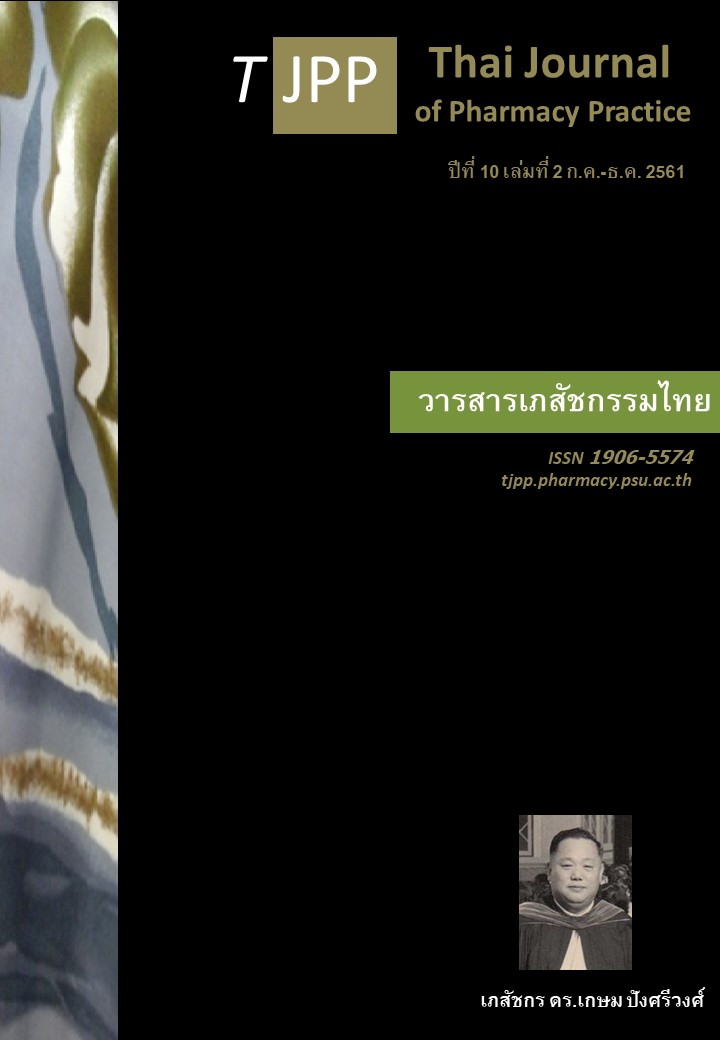ประสิทธิภาพและความปลอดภัยของยา docetaxel ในการรักษาอันดับรอง ในผู้ป่วยมะเร็งปอดชนิดเซลล์ไม่เล็กระยะแพร่กระจาย
Main Article Content
บทคัดย่อ
วัตถุประสงค์: เพื่อศึกษาประสิทธิภาพและความปลอดภัยของยา docetaxel ในการรักษาอันดับรองสำหรับผู้ป่วยมะเร็งปอดชนิดเซลล์ไม่เล็ก (non-small cell lung cancer หรือ NSCLC) ระยะแพร่กระจาย ณ โรงพยาบาลมหาวิทยาลัยนเรศวร วิธีการ: การศึกษานี้เป็นการวิจัยเชิงสำรวจโดยเก็บข้อมูลย้อนหลังจากเวชระเบียนและฐานข้อมูลอิเล็กทรอนิกส์ ของผู้ป่วยที่ได้รับการวินิจฉัยว่าเป็น NSCLC ระยะแพร่กระจายที่เคยได้รับการรักษาด้วยยาเคมีบำบัดอันดับแรกมาก่อน และได้รับยา docetaxel เป็นการรักษาอันดับรอง ตั้งแต่วันที่ 1 ตุลาคม พ.ศ. 2553 ถึงวันที่ 30 มิถุนายน พ.ศ. 2559 การวิจัยวิเคราะห์ประสิทธิภาพโดยวัดค่ามัธยฐานการมีชีวิตรอด (median-overall survival) ระยะเวลาการรอดชีพแบบปลอดการลุกลามเพิ่มขึ้นของมะเร็ง (progression-free survival) อัตราการตอบสนอง (response rate) และผลข้างเคียงจากยา ผลการวิจัย: จากตัวอย่าง 34 ราย สามารถวิเคราะห์ประสิทธิภาพของยา docetaxel ได้ในผู้ป่วยจำนวน 27 ราย median-overall survival หลังได้รับยา docetaxel เท่ากับ 10.13 เดือน (95%CI 7.71-12.55) progression-free survival เท่ากับ 3.47 เดือน (95%CI 2.13-4.81) ผู้ป่วยมี overall response จำนวน 2 ราย รวมทั้งยังพบการตอบสนองแบบ stable disease จำนวน 10 ราย และ progressive disease จำนวน 12 ราย การวิเคราะห์ความปลอดภัยของยา docetaxel ในผู้ป่วยทุกราย พบว่า เกิดผลข้างเคียงทางโลหิตวิทยา ได้แก่ โลหิตจางในผู้ป่วย 31 ราย พบเม็ดเลือดขาวนิวโทรฟิวต่ำในผู้ป่วย 20 ราย และเกิดเม็ดเลือดขาวนิวโทรฟิลต่ำร่วมกับมีไข้ จำนวน 2 ราย โดยมีผู้ป่วย 1 ราย เสียชีวิตจากภาวะดังกล่าว และเกล็ดเลือดต่ำ จำนวน 1 ราย ผลข้างเคียงที่ไม่ใช่ทางโลหิตวิทยาที่พบบ่อย เช่น อ่อนล้า (17 ราย) เยื่อบุช่องปากอักเสบ (12 ราย) คลื่นไส้ (10 ราย) และอาเจียน (7 ราย) สรุป: ผู้ป่วยที่ใช้ยา docetaxel ในการรักษาอันดับรองสำหรับ NSCLC ระยะแพร่กระจาย มี median-overall survival, progression-free survival และ response rate ใกล้เคียงกับการศึกษาก่อนหน้า ผลข้างเคียงจากยา docetaxel ในการศึกษานี้มีอุบัติการณ์การเกิดสูงกว่าเมื่อเปรียบเทียบกับการศึกษาก่อนหน้าทั้งผลทางโลหิตวิทยาและไม่ใช่ทางโลหิตวิทยา
Article Details
ผลการวิจัยและความคิดเห็นที่ปรากฏในบทความถือเป็นความคิดเห็นและอยู่ในความรับผิดชอบของผู้นิพนธ์ มิใช่ความเห็นหรือความรับผิดชอบของกองบรรณาธิการ หรือคณะเภสัชศาสตร์ มหาวิทยาลัยสงขลานครินทร์ ทั้งนี้ไม่รวมความผิดพลาดอันเกิดจากการพิมพ์ บทความที่ได้รับการเผยแพร่โดยวารสารเภสัชกรรมไทยถือเป็นสิทธิ์ของวารสารฯ
เอกสารอ้างอิง
2. Islami F, Torre LA, Jema A. Global trends of lung cancer mortality and smoking prevalence. Transl Lung Cancer Res 2015;4:327-38.
3. International agency for research on cancer. Lung cancer estimated incidence, mortality and prevalence worldwide in 2012 [online]. 2017 [cited Jul 9, 2017]. Available from: globocan.iarc.fr/Pages /fact_sheets_cancer.aspx.
4. National Cancer Institute. Hospital based cancer registry 2015. Bangkok: Pornsup Printing; 2017.
5. NCCN clinical practice guideline in oncology (NCCN guidelines). Non-small cell lung cancer v.7.2017 [online]. 2017 [cited Jul 9, 2017]. Available from: www.nccn.org/professionals/physician_gls/pdf/nscl.pdf.
6. Fossella FV, DeVore R, Kerr RN. Randomized phase III trial of docetaxel versus vinorelbine or ifosfamide in patients with advanced non-small-cell lung cancer previously treated with platinum-containing chemotherapy regimens. The TAX 320 non-small-cell lung cancer study group. J Clin Oncol 2000;18:2354-62.
7. Fidias PM, Dakhil SR, Lyss AP, Loesch DM, Water house DM, Bromund JL, et al. Phase III study of immediate compared with delayed docetaxel after front -line therapy with gemcitabine plus carboplatin in advanced non-small-cell lung cancer. J Clin Oncol 2009;27:591-8.
8. Garon EB, Ciuleanu TE, Arrieta O, Prabhash K, Syrigos KN, Goksel T, et al. Ramucirumab plus docetaxel versus placebo plus docetaxel for second-line treatment of stage IV non-small cell lung cancer after disease progression on platinum-based therapy (REVEL): a multicentre, double-blind, randomised phase 3 trial. Lancet 2014; 384: 665-73.
9. Borghaei H1, Paz-Ares L, Horn L, Spigel DR, Steins M, Ready NE, et al. Nivolumab versus docetaxel in advanced nonsquamous non–small-cell lung cancer. N Engl J Med 2015;373:1627-39.
10. Gridelli C, Ardizzoni A, Ciardiello F, Hanna N, Heymach J, Perrone F, et al. Second-line treatment of advanced non-small cell lung cancer. J Thorac Oncol 2008;3:430–40.
11. Jänne PA, van den Heuvel MM, Barlesi F, Cobo M, Mazieres J, Crinò L, et al. Selumetinib plus docetaxel compared with docetaxel alone and progression-free survival in patients with KRAS-mutant advanced non-small cell lung cancer: The SELECT-1 randomized clinical trial. JAMA 2017; 317:1844-53.
12. Kenmotsu H, Tanigawara Y. Pharmacokinetics, dynamics and toxicity of docetaxel: Why the Japanese dose differs from the Western dose. Cancer Sci 2015;106:497–504.
13. Park K, Kim JH, Cho EK, Kang JH, Shih JY, Zim mermann AH, et al. East Asian subgroup analysis of a randomized, double-blind, phase 3 study of docetaxel and ramucirumab versus docetaxel and placebo in the treatment of stage IV non-small cell lung cancer following disease progression after one prior platinum-based therapy (REVEL). Cancer Res Treat 2016;48:1177-86.
14. Yoh K, Hosomi Y, Kasahara K, Yamada K, Takahashi T, Yamamoto N, et al. A randomized, double-blind, phase II study of ramucirumab plus docetaxel vs placebo plus docetaxel in Japanese patients with stage IV non-small cell lung cancer after disease progression on platinum-based therapy. Lung Cancer 2016; 99: 186–93.
15. Nakamura Y, Kunitoh H, Kubota K, Sekine I, Yamamoto N, Tamura T, et al. Retrospective analysis of safety and efficacy of low-dose docetaxel 60 mg/m2 in advanced non–small cell lung cancer patients previously treated with platinum-based chemotherapy. Am J Clin Oncol 2003; 26: 459–64.
16. Mukohara T, Takeda K, Miyazaki M, Takifuji N, Terakawa K, Negoro S. Japanese experience with second-line chemotherapy with low-dose (60 mg/m2 ) docetaxel in patients with advanced non-small-cell lung cancer. Cancer Chemother Pharmacol 2001; 48: 356-60.


